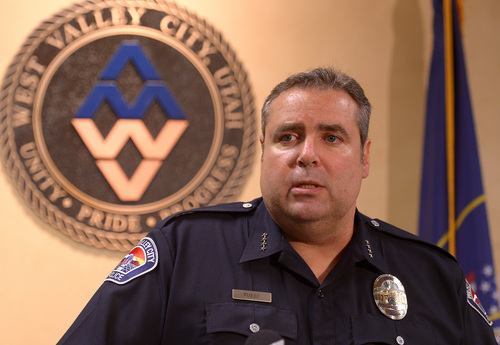This is an archived article that was published on sltrib.com in 2014, and information in the article may be outdated. It is provided only for personal research purposes and may not be reprinted.
A good cop should be equally comfortable stepping into a church, a gay bar, a school, a strip club, a bank or a neighborhood where the folks speak any number of languages or come from any sort of ethnic or cultural roots. And once there, to enforce the law and keep the peace without fear or favor.
That's one reason why it can be hard to be a good cop.
In West Valley City, new Police Chief Lee Russo leads an agency that has been singled out in a new Census data survey as one of the least "racially balanced" police departments in the country. In his case, a city where a third of the population is Hispanic in origin, only 6 percent of the police force is.
West Valley City also has sizable populations of Vietnamese and Pacific Island heritage. Russo says he is continually looking for potential officers who are of any and all of those cultures, who literally speak the language, or are at least familiar with the people they may find themselves dealing with, often under trying circumstances.
Success in those endeavors would, of course, go a long way toward improving the relationship between the community and the police officers who serve it. It will be an ongoing problem, the chief notes, because he cannot just step out onto the street and nab passers-by to become police officers.
Absent any easy way to make his department mirror the ethnic makeup of his city, Russo has made the most of what he has, which includes many Anglo officers who served LDS missions in Latin American countries and training programs that focus on "cultural awareness."
Such training is key to modern police work, and any city that is not already doing it should start.
All this is of interest because of what happened in Ferguson, Mo. That's where an unarmed black teenager was killed by a white officer and where, in the glare of the resulting national media invasion, it came out that a city with a mostly black population has a nearly all-white police department.
The natural worry is that, if the streets are filled with people of one type, and police cruisers are filled with people of another type, levels of mistrust and fear will grow so great as to make the occasional violent confrontation inevitable.
It also benefits police enormously if residents of all walks of life feel the law enforcement establishment is there to serve them, that they can report crimes or otherwise deal with a police force that values them as people and does not jump to racial profiling conclusions or treat anyone as though they are not worthy of equal protection of the laws.
As the roll call sergeant on "Hill Street Blues" might now say, "Hey, let's be aware out there."



